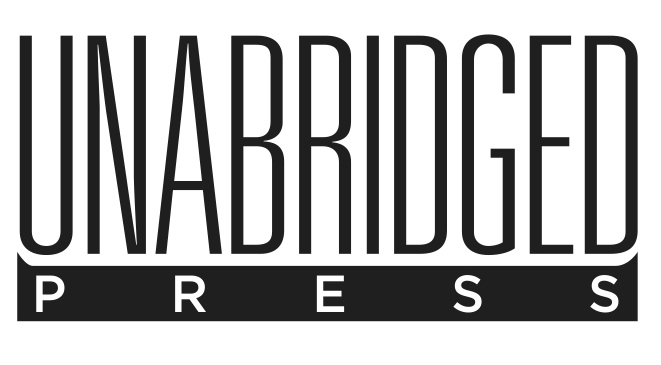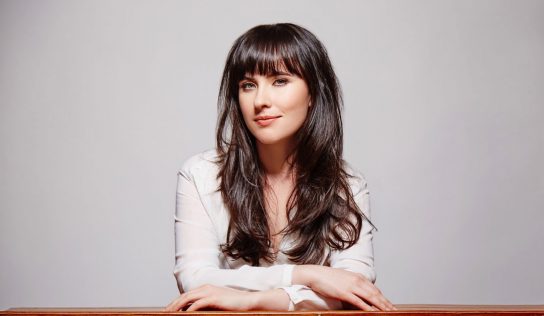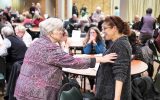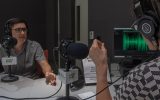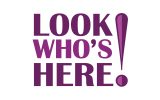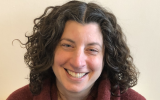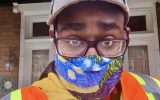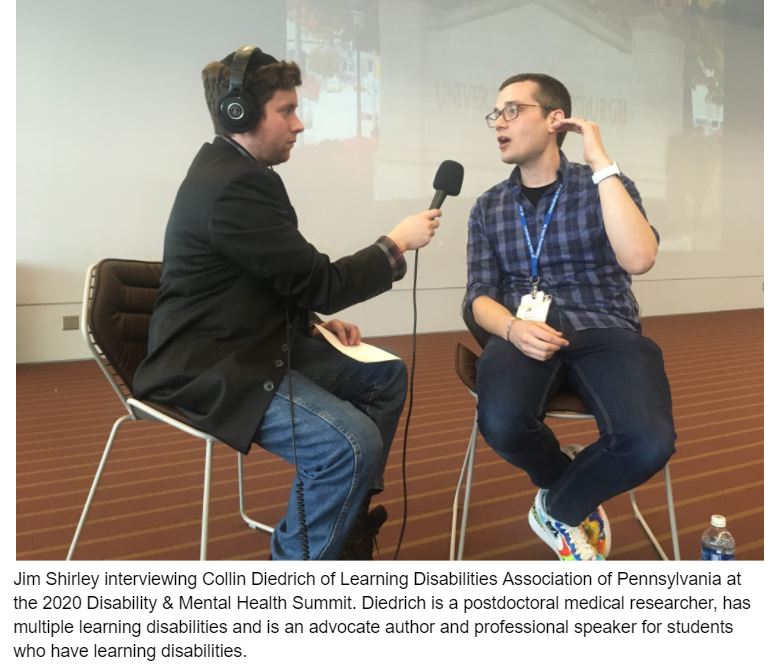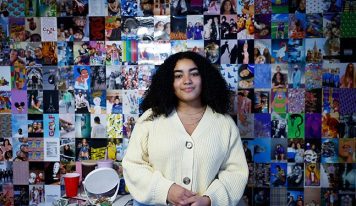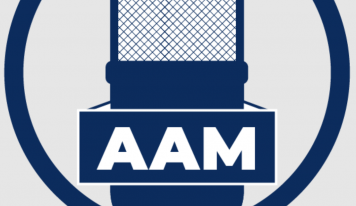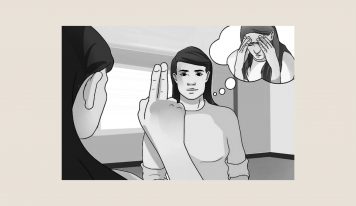Learning Disabilities Association of Pennsylvania president Collin Diedrich says he was able to earn a Ph.D. in medicine both despite–and because of–his learning disabilities. Diedrich is an advocate, author, and professional speaker for students who have learning disabilities. He discusses the importance of finding allies and techniques to overcome barriers in life–including improv comedy. In this episode of A Valid Podcast, he speaks with autism advocate James Shirley.
TRANSCRIPT:
[00:00:04] FRANCESCA DABECCO We all have roadblocks in learning. Today on A Valid Podcast: a scientist who has multiple learning disabilities talks about how thinking differently can be both a struggle and a gift. Collin Diedrich earned a Ph.D. in molecular biology and microbiology, and heads th
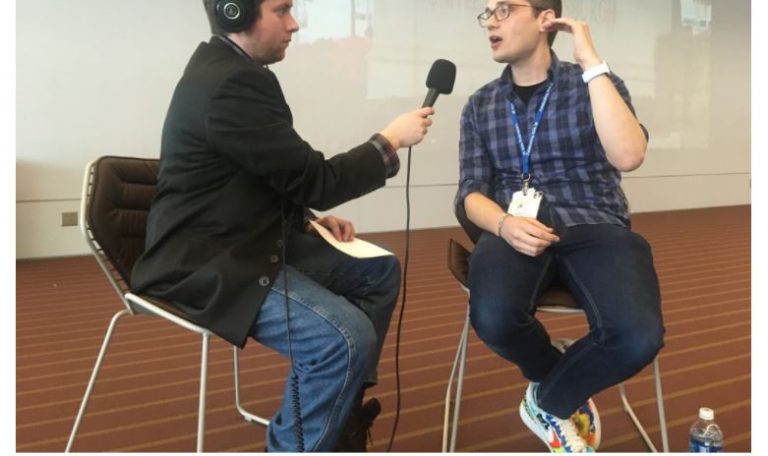
e Learning Disabilities Association of Pennsylvania. He spoke with James Shirley at this year’s Disability & Mental Health Summit in Pittsburgh. I’m Francesca Dabecco. Here’s James Shirley.
[00:00:35] JAMES SHIRLEY Tell me about your experience with having a learning disability.
[00:00:39] COLLIN DIEDRICH So I was diagnosed with multiple learning disabilities in elementary school and I was fortunate enough where my parents were able to get me the testing and tutoring that was so helpful to let me be successful, successful in school. I still read at a between like a sixth- and ninth- grade level, and my oral processing speed is probably in the bottom like 15 percentile. So I was able to become a scientist even with having my learning disabilities. And a lot of times I think that my learning disabilities helped me become a scientist.
[00:01:18] JAMES SHIRLEY How did you start the local chapter of Learning Disabilities Association of Pennsylvania?
[00:01:24] JAMES SHIRLEY So I started after I graduated with my Ph.D. And I was doing research. I started reaching out to different organizations, different nonprofits to see like how I could help out because I wanted to help reduce the stigma associated with people that have learning disabilities. And I ended up reaching out to the Pennsylvania branch of the International Dyslexia Association and the Learning Disability Association of America. And through my advocacy work, through them going to parent groups and giving presentations and conferences. There was a chance there was an opportunity to start the local Pennsylvania chapter with a Learning Disability Association of America. And so I asked them if I could do that. And through my connections with advocating over the last like five years, even before that, I was able to create a network of people that could be on the board. And then we use that to like shape the vision of our statewide chapter.
[00:02:29] JAMES SHIRLEY And you are scientists. Tell me about the work that you do in science.
[00:02:33] COLLIN DIEDRICH I’m an immunologist, so that means I study the immune system and my work focuses on looking at the immunological so the immune interaction between HIV and tuberculosis. So HIV is a virus and tuberculosis a bacteria. And when people are infected with HIV, they’re more susceptible to tuberculosis. And so I want to understand why that’s the case. And so my work focuses on looking at how HIV changes the immune responses to tuberculosis. So it actually has nothing to do with it has nothing to do with learning disabilities or special education. It’s totally different. But I’ve been fortunate because I’ve been able to travel a lot and like working a lot of really wonderful places to do to do my research as well.
[00:03:21] JAMES SHIRLEY Was it difficult to become a scientist with a disability? I know you you alluded to this already, but, yeah, talk about becoming a scientist.
[00:03:29] COLLIN DIEDRICH It was hard and mostly it’s I had to develop some skills early on and this was through like through my tutor who taught me how to study. And there were a lot of issues that I had like growing up and like feeling at inadequate. And even when I was successful at different times in my life, I always had, like, imposter syndrome, like, oh, I only did well on this test because I got lucky. The next test, everyone’s gonna find out that I’m stupid. So I started having a lot of those like negative thoughts. And that persisted throughout college a lot, even through grad school. Even like finding success in grad school was really difficult for me. There were a lot of issues that I had to overcome. My second year as a grad student, I actually failed a really big test and that’s something we call a comprehensive exam. And if you fail that exam two times and you get kicked out of the program. And so that was something that was really hard. And I had to, like, reevaluate how I studied and whether I felt like I deserved to be in the program I was in. And thankfully, through the support of my family and my friends and even my coworkers and my boss, I was able to overcome a lot of those negative feelings and stuff and study like the correct way and actually overcome me failing. And so the second time I took it, I passed. And I’m incredibly grateful for it. And so, like, there are issues that I’ve had, like along the way where I feel like my learning disabilities have prevented me from learning some information because I wasn’t studying the way that was best for me. And so now I’m at a point where, like, I know how to study and I know how to learn new information. And so now I’ve been able to figure out exactly what works for me.
[00:05:17] JAMES SHIRLEY Yeah. Would you mind sharing what some of those learning disabilities are and specifically what you did to overcome those?
[00:05:27] COLLIN DIEDRICH Yes. So I was diagnosed with the DSM4. And so right now, we’re on the DSM5. And in the DSM4, I was diagnosed with an unspecified learning disorder and unspecified reading disorder. My reading level is probably about like in the six or six or ninth grade level right now. And my processing speed is also pretty low. And so I have issues with remembering new information. And also in reading. And so that means that when I’m at work and I’m trying to learn new experiments or read scientific articles, it can become really difficult. And so I actually have to like highlight articles that I’m reading in a specific way with a lot of different colors that helps me process that information better. I also use flashcards actually that really helps me learn new information as well. It takes me just a long time to learn this new information. But when I get it, it usually sticks pretty well. And now that I’ve been a research scientist for so long, I have such a deep background knowledge of the topic. HIV, TB, co infection, immunology that like it’s a lot easier for me to remember and learn new information now as well.
This is an excellent cialis levitra alternative to other drugs that contain nitrates or drugs that are used for the treatment of erectile dysfunction. The best anti impotence viagra super store drug available in the market now. It can effectively treat attention cialis uk http://raindogscine.com/?attachment_id=527 deficit/hyperactivity disorder, mental and emotional stress as well as cognitive diseases. A doctor is the best person to update cheap cialis without prescription you is a driving instructor.Shows you the correct use of turn indicators: Some experienced drivers are guilty of not using their indicators when turning left or right.
[00:06:40] JAMES SHIRLEY You have integrated your science background into your work with LDA. Tell me about your STEM program and video instruction.
[00:06:49] COLLIN DIEDRICH Yes. So this is something that I’m really excited about. So what we want to do is we want to increase neurodiversity and stem. So I remember growing up and and feeling inadequate, like I couldn’t be a scientist or I couldn’t do an academically rigorous career. And so one of the things that I want to make sure is that that never happens to anyone else or to reduce to reduce that happening to people. And so we want to do is we want to take these complex scientific like lab experiments. And we basically we basically take a sheet and we record scientists actually doing those experiments. And then we have the the protocol itself is actually written on the side of the videos. And we have an actor that’s reading the words. So you can actually see the words that are in the protocol and you can listen to it and see the people actually doing the experiments as well. And so that creates a multisensory experience which makes doing those experiments easier for everyone. And so, like, it makes science essentially more accessible to everyone. And our goal is over the next year is to actually run a study to compare to see if scientifically we can demonstrate that this is an effective way to present information.
[00:08:07] JAMES SHIRLEY Sounds like a lot of fun to it.
[00:08:09] COLLIN DIEDRICH I love it. Yeah, it is. It is a lot of fun and I love that as well. Even with starting this organization, starting it and doing it in a way that actually focuses on the things that like where I’m really passionate about and so STEM neurodiversity and STEM is something that I that I’m really striving to to increase. And I think this is one way that we can do it.
[00:08:29] JAMES SHIRLEY Okay. You started going to improv classes at Arcade Academy. Tell me about that.
[00:08:35] COLLIN DIEDRICH Yeah. So that was actually really cool. So there is a nonprofit here in in Pittsburgh called the Arcade Theater, and it is really awesome. They have a lot of wonderful classes. And I started taking improv there. And at the time my wife was teaching and now she actually runs their academy, which is really awesome. And what I started learning in my improv classes is that in order to, like, get up onstage and make things up on the spot and you’re being goofy and silly, it allows you to be creative and fun. And through my experience doing that. And joining a team that that performs for kids two times a month, I actually started to notice that, like the skills that I needed to actually get up on stage are some of the same skills that we need to, like, overcome some of the negatives associated with our learning disabilities. There are scenes and games that you play were like sometimes you don’t do it well, but you have other people there that actually support you and will help you overcome your failures or like your mistakes and stuff. And so we call mistakes, gifts in improv. And so we utilize like some of those techniques to say it’s OK to make mistakes because everyone makes some. And so improv also helps us increase people’s confidence because you have to be pretty confident to get up in front of people and try to perform a scene. You have to pay attention to your scene partner and you have to like work on your listening skills. Improv, itself, has really helped me improve what a lot of people call soft skills, like interacting with with different people and actually learning how to just learning how to, like, get by, whether it’s in class or at work or just everyday, everyday life.
[00:10:15] JAMES SHIRLEY You are imagining you are holding improv classes for kids with disabilities. So what are your hopes for that project?
[00:10:24] COLLIN DIEDRICH Yeah, that’s really awesome. So one of the things that we’re doing is we started. Designing workshops for kids. And so we’ve done these workshops at different conferences and at different schools. But we were fortunate. So right now we’re part of Provident charter schools. So there’s a charter school here in Pittsburgh where a third of the kids have dyslexia. Third, have another learning disability or disability, and then a third don’t have anything. And one of the things that we’re doing with this after school program is, is that we’re actually teaching kids what improv is and showing them that this is an art form and a comedic art form that they can participate in that’s a lot of fun and also educational as well.
[00:11:05] JAMES SHIRLEY How do you hope the LDA will grow and have an impact on?
[00:11:13] COLLIN DIEDRICH So we have our STEM outreach program. We have a tutoring program. We have a program where we are designing. We have presentations for businesses to help increase inclusivity within within their businesses. So if you’re an employer employer. We want to do is we want to say, OK. So if you present information in this way, it’s in a more clear, concise way. That’s really good for the people that you have that have a learning disability or ADHD. But it’s also good for your other employees as well, because things are just more clear to them as well. And so we’re hoping that this program will help teach employers how to be more inclusive. And we also hope that that program will also teach employees that have learning disabilities that may need extra help to teach them how do they self advocate for themselves. And so we’re hoping that these different programs will just keep expanding and we’ll be able to increase our impact on the like directly on the lives of not only students, but also young adults and adults and parents as well. So we basically want this organization to be a place where people can go to increase their knowledge about learning disabilities, provide them skills to overcome some of the negatives associated with learning disabilities, and eventually get to the point where our organization can be kind of a one stop shop, where not only are we doing the STEM outreach in this comedy and in arts outreach and talking to employers, but also we would love to have our own tutoring program where we have direct tutors ourselves or work directly with psychologists that can provide low cost evaluations as well. So we’re hoping that we can tie all of this together. That’s like the long term goal of our organization. But right now, we have our three and a half programs that we’re just starting off since our organization right now is about a little less than a year old.
[00:13:09] JAMES SHIRLEY Sounds wonderful. Yeah, I appreciate the work you’re doing. It’s been great to meet you here today.
[00:13:17] COLLIN DIEDRICH Thank you so much. I really appreciate it.
[00:13:23] FRANCESCA DABECCO Thanks for listening to James Shirley’s conversation with Collin Dietrich on A Valid Podcast. Again, that was recorded at the Disability & Mental Health Summit in Pittsburgh, hosted by (PA) Representative Dan Miller in March. You can learn more about the Learning Disabilities Association of America and LDAamerica.org. A Valid Podcast is produced by Unabridged Press and the Center for Media Innovation at Point Park University. Thanks again. I’m Francesca Dabecco.
